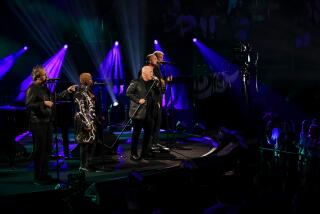Billy Elliot mugged on Broadway
NEW YORK — “Billy Elliot: The Musical,” the stage version of Stephen Daldry’s heartwarming movie about an 11-year-old lad who dons a pair of ballet slippers in defiance of his coal-mining father’s cramped notions of masculinity, confirms a truth that really didn’t need confirming after “Mamma Mia!” -- there’s a thin line between a mega-hit and a mega-mediocrity.
A smash in London ever since its West End premiere in 2005, “Billy Elliot” arrives at the Imperial Theatre with its parts intact but its spirit plasticized and pasted with glitter. This global theatrical phenomenon, which has already spawned a cash cow in Australia, might be considered a landmark in one unenviable respect: Broadway finally has in its over-hyped midst a major opening of road-show quality. (OK, provinces, cut the snickering.)
In London, “Billy Elliot” managed to capitalize on its stirring saga to overcome Elton John’s insipid pop-rock score and Lee Hall’s clunky book and shopworn lyrics. Daldry’s direction may have been slick in all the usual ways of the modern-day musical machine, but it never shortchanged the story’s emotional core. I left the theater dry-eyed yet secretly softened. And even as I shuddered on the Tube back to my hotel at different aspects of the faulty artistry (laugh lines that pleaded like a television audience warmup, musical numbers that were eerily reminiscent of Ethel Merman’s disco album), the memory glowed with tender excitement.
In New York, the innocence isn’t just overshadowed by bells and whistles -- it gets mugged by them. The poor motherless Elliot home doesn’t stand a chance against all the bullying showmanship. But equally problematic is the way the cast never coalesces into a believable North England family suffering in the mid-1980s under Margaret Thatcher’s union-busting rule.
Graceful dancer
David Alvarez, the Billy I caught (there are three), is an absolute marvel of balletic grace. The poise of his movement is mesmerizing, and the way his eyes blaze with desire to attain perfect physical form sheds light on his character’s uphill quest. You can’t help cheering for him, even as you wish his acting (on par with a dance double) was as confident as his arabesque.
Gregory Jbara vividly portrays Billy’s bruising dad, a worn-out mine worker who doesn’t mind doling out precious spare change for after-school boxing lessons but goes absolutely ballistic when he catches his kid prancing around with a gaggle of tutus. Jbara shows us the strain of a widower struggling to be both mother and father to a boy at a time when the local economy is undermining his status as breadwinner. But their relationship is always more plotted than personal.
Carole Shelley, hamming it up as Billy’s senile grandma, and Santino Fontana, looking as though he were airlifted into this alien milieu without a guidebook, make up the rest of Billy’s nearest and dearest. In keeping with Ian MacNeil’s sculptural set design, the household is only meant to be sketched, but the kinship connections are so cursorily rendered that they’re rarely ever touching.
As Billy’s dance instructor, Haydn Gwynee, who created the role of Mrs. Wilkinson in the London production, paints a pastel portrait of a rapidly aging woman with a long ash on her cigarette and a slight hangover squint. She knows her future is behind her, yet she can’t resist becoming passionate about the unusual promise of her boy pupil.
Mrs. Wilkinson’s wisecracking prevents Gwynee from overplaying the pathos of a semi-reluctant mother-surrogate. For sentimental sniffles of that kind, there’s Billy’s dead Mum (Leah Hocking) to inform him that he left his sneakers in his bedroom.
Despite the brief film footage at the top of the show offering audiences an informational head start, the miners’ standoff with the British government isn’t adequately contextualized. When riot police are all of a sudden dancing with the girls in Billy’s class -- in one of Peter Darling’s imaginatively colliding choreographic numbers -- the underlying labor issues have to be partly surmised.
Ersatz score
A musical lives or dies by its music, and there’s no getting around the ersatz quality of John’s score. It can be smooth and catchy, but the hooks are too insistent, and the whole mishmash palette of sound (from boogie to rock) rushes by in a stream of amnesia.
A small but not inconsequential change is the treatment of Michael, Billy’s little cross-dressing buddy. Frank Dolce (who alternates with another actor) seems to be reassuring all sensibilities that he’s a real boy playing a make-believe character. For a work that wants to tackle gender roles head-on, this is a cop-out.
In only one area does the show exceed its original poignancy. When Alvarez lifts his arm or torques his body, all the Broadway schlock is momentarily banished, and the stakes of Billy’s Royal Ballet School audition assume an almost life-or-death importance.
If “Billy Elliot” had stayed true to this simplicity, it could have broken more than Broadway’s bank.
--
More to Read
The biggest entertainment stories
Get our big stories about Hollywood, film, television, music, arts, culture and more right in your inbox as soon as they publish.
You may occasionally receive promotional content from the Los Angeles Times.











